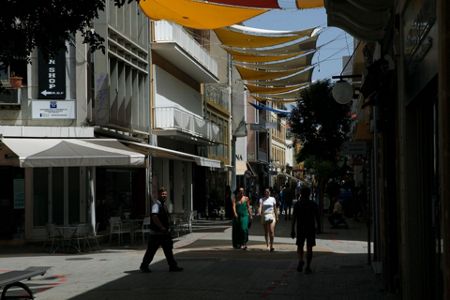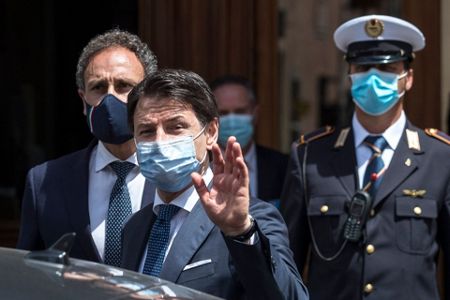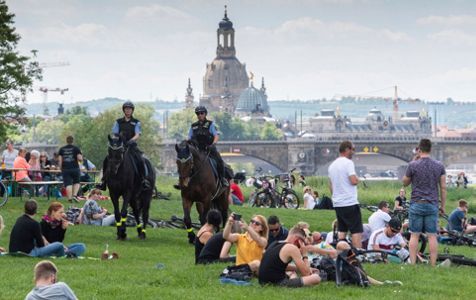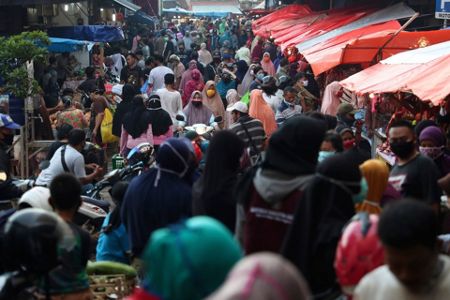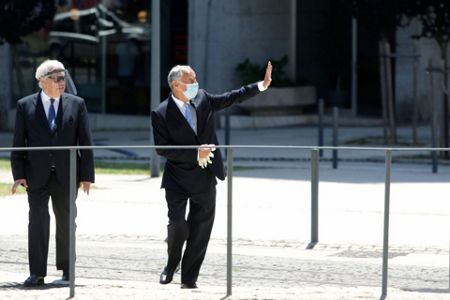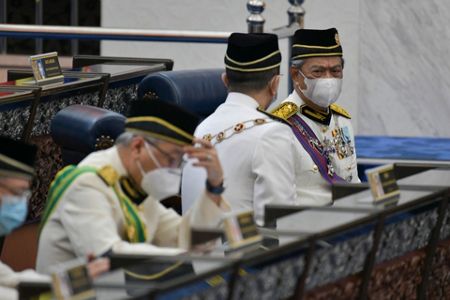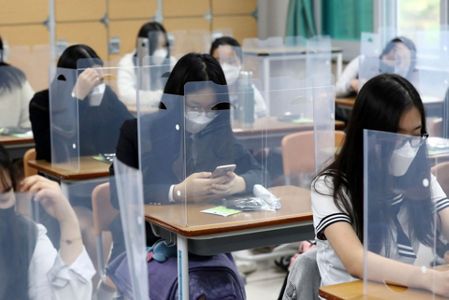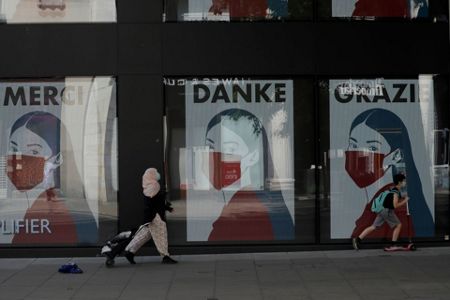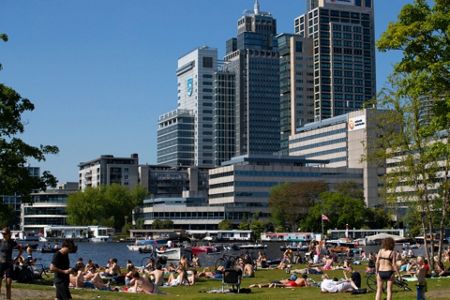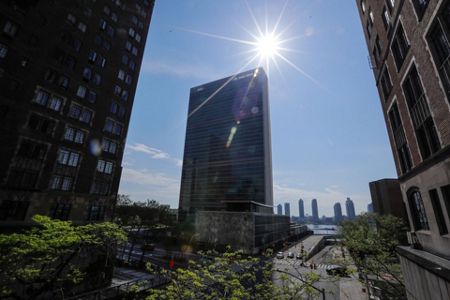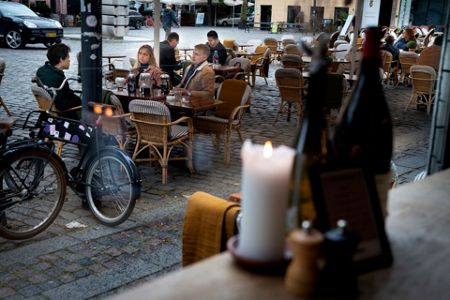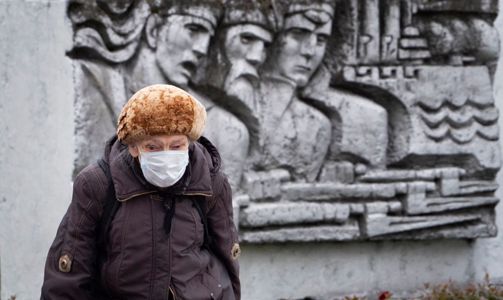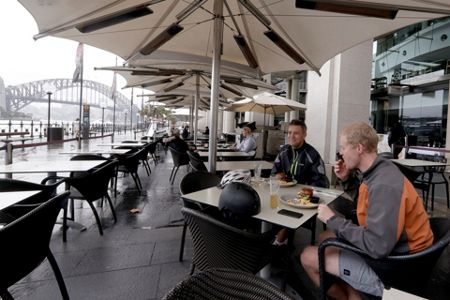The Latest on the coronavirus pandemic. The new coronavirus causes mild or moderate symptoms for most people. For some, especially older adults and people with existing health problems, it can cause more severe illness or death.
TOP OF THE HOUR:
— President Putin says virus stabilized in Russia.
— Italy drug agency leader warns of anti-malaria drug use.
— Virus accelerates across Latin America, India, Pakistan.
___
KEYSTONE, S.D. — Mount Rushmore is opening sooner than expected. The national memorial and its facilities and restaurants will be opening Saturday, about three weeks earlier than previously planned.
The National Park Service’s website says the grounds will be open from 5 a.m. to 11 p.m.
“After careful consideration and consultation with local and state health authorities, we are pleased to announce that Mount Rushmore’s parking lot, retail shops, and Memorial Team Ice Cream will open earlier than expected on Saturday, May 23,” according to the memorial’s Facebook.
The Nature Trail and the Presidential Trail will be open to the base of the mountain, and the Sculptor’s Studio will be open. The park service says the information center and gift shop are closed and all educational and interpretive programs are suspended.
The amphitheater, Avenue of Flags and a short section of the Presidential Trail are closed due to deferred maintenance.
Visitors are encouraged to maintain physical distancing and hand sanitizer dispensers are available in multiple locations. Employees will be wearing personal protective equipment that is appropriate for their job responsibilities.
___
ROME — Italy has registered 652 new coronavirus cases, even as the number of people in the country known to be currently positive for COVID-19 continues to decline.
According to Health Ministry figures, the nation where the outbreak began in Europe now has 228,658 cases. Nearly 300 of the latest confirmed infections were registered in Lombardy, the northern region which also has had the highest number of deaths in Italy.
In the 24-hour period ending Friday evening, 130 deaths nationwide of infected patients were confirmed, raising Italy’s overall death count to 32,616.
But in recent days, various government agencies, comparing the numbers of deaths during the outbreak this year to the same period last year, have concluded that surely far more persons who died this year likely had COVID-19 but weren’t tested. Many who died in nursing facilities or in their own homes didn’t receive COVID-19 tests.
___
NICOSIA, Cyprus — Cyprus plans to resume commercial flights next month from select countries with low COVID-19 infections.
Cyprus’ Transport Minister Yiannis Karousos says flights will begin from countries, selected by a team of medical experts, on June 9 and June 20.
The first group includes Greece, Malta, Bulgaria, Norway, Austria, Finland, Slovenia, Hungary, Israel, Denmark, Germany, Slovakia and Lithuania. The second group includes Switzerland, Poland, Romania, Croatia, Estonia and the Czech Republic.
Karousos says starting June 9, passengers arriving from countries in either group must get a health certificate confirming they virus-free three days before departure.
Starting June 20, passengers from the first group of countries won’t need health certificates, but those from second group will still be required to produce.
Hotels will open on June 1.
___
JACKSONVILLE, Fla. -- Florida Gov. Ron DeSantis says summer camps and youth activities can open without restrictions.
He says local organizations and governments can set rules and guidelines. The state won’t pre-empt those rules.
DeSantis says there have been no deaths in Florida of people under age 25.
Also, Miami Beach city commissioners agreed to open beaches and hotels on June 1, a week after the Memorial Day holiday weekend. Officials say they didn’t want large crowds at the beach over the long holiday weekend that unofficially kicks off the summer season.
On Friday, there was more than 49,000 reported cases in Florida, with more than 2,100 deaths. The median age of people infected was 54 years old.
___
GAZA CITY, Gaza Strip — Gaza’s Hamas rulers have allowed mosques to reopen for Friday prayers for the first time since March despite a spike in coronavirus cases.
Worshippers brought their own prayer rugs, wore masks and kept space between themselves. They were given hand sanitizer at the entrances to mosques. The opening came ahead of the Eid al-Fitr holiday, marking the end of the holy month of Ramadan.
Authorities in Gaza have reported 35 new cases in recent days, bringing the total number to 55. All the new cases were detected in quarantine facilities. But they have renewed concerns about a wider outbreak that could overwhelm the depleted health care system in the impoverished territory, which is home to 2 million people.
Hamas says it would bar the entry of returnees until the end of June to allow health workers to deal with the new cases.
___
ATHENS, Greece -- Greece’s government has backed a plan to impose major traffic restrictions in central Athens over the summer.
The restrictions were proposed by Athens and include a ban for most vehicles along several central streets close to Parliament. City authorities say they hoped to launch the ban in mid-June for three months with a possible extension to follow.
Traffic was limited during the lockdown imposed in late March that was eased earlier this month, prompting many city residents to take up cycling and jogging in the downtown area.
Authorities reported one new death and 21 new infections on Friday, bringing the death toll to 169 and the total confirmed cases to 2,873.
___
MADRID — Spain’s foreign ministry says more than 700 Spaniards and Moroccans residents in Spain are returning by ferry from Morocco after a two-month wait.
They had been stranded in Morocco since the COVID-19 pandemic hit Europe and northern Africa in early March.
The ferry is leaving from Tangier and will arrive in Málaga on Friday evening.
It’s the first ferry Spain’s government has sent to recover nationals and residents from Morocco during the health crisis. Spain’s government had previously arranged flights to return home from Morocco.
___
YANGON, Myanmar — A court in Myanmar has sentenced a journalist to two years in prison for a story that erroneously reported a death from COVID-19.
The lawyer for Zaw Ye Htet, an editor with the Karen State-based news agency Dae Pyaw, says his client was sentenced Wednesday under the Penal Code. It deems it an offense to publish or circulate any rumor or report that can cause fear or alarm among the public that may induce unrest.
The lawyer, Myint Thu Zar Maw, says Friday his client was arrested on April 13, the same day he published the incorrect report of the death in Myawaddy, a city on the border with Thailand.
Zaw Ye Htet’s wife, Phyu Phyu Win, says her husband acknowledged the error after being summoned by police. He posted a correction online, but was arrested.
Myanmar and international rights groups say the government uses the broadly worded Section 505(b) to stifle criticism and political dissent.
___
MOSCOW — Russian President Vladimir Putin says the coronavirus has stabilized in the country, with the number of new infections abating.
Putin, speaking during Friday’s video conference with top officials, says “the positive dynamic is not so fast as we would like it to be, sometimes even unstable, but it does exist.”
Russia currently ranks second behind the United States in the number of infections with more than 326,400 reported cases and more than 3,200 deaths. The U.S. has more than 1.5 million cases and leads the world with more than 90,000 deaths.
The Russian leader says the positive trends set the stage for further lifting restrictions, but he emphasized the need to preserve the hospital capacity for a possible new wave of contagion.
Officials have reported to Putin the hospitals treating COVID-19 patients are currently filled by just over half and the influx of patients, particularly those in grave condition, has been decreasing.
The coronavirus mortality rate in Russia has remained remarkably low at about 1 percent, drawing suspicions in the West that the country was under-reporting its death toll. Russian officials have rejected the claim, saying the low death toll reflected efficient preventative measures and broad testing.
___
GENEVA — The United States says it wants the World Health Organization to start work “now” on a planned review of the WHO’s coordinated international response to the COVID-19 outbreak.
The U.N. health agency is facing a Trump administration threat to cut off funding.
Adm. Brett Giroir, an assistant secretary in the U.S. Department of Health and Human Services, sent a written letter to the U.N. health agency’s executive board meeting on Friday saying the United States believes the WHO can “immediately initiate organizational processes for the review,” such as by bringing together independent health experts and setting up guidelines for it.
Giroir is one of the board’s 34 international members but didn’t participate in person in the board’s first virtual meeting on Friday.
He alluded to a resolution passed Tuesday by the WHO’s assembly calling on its director-general, Tedros Adhanom Ghebreyesus, to launch “comprehensive evaluation” of the WHO-coordinated international response to the outbreak to begin “at the earliest appropriate moment.”
___
TOPEKA, Kan. — Republicans have pushed a sweeping coronavirus measure through the GOP-controlled Kansas Legislature, aiming to shield businesses and health care providers from coronavirus-related lawsuits.
The bill approved by lawmakers Friday would take control over the state’s pandemic response from Democratic Gov. Laura Kelly and give much of it to the Legislature’s mostly Republican leaders.
Some Democrats predicted Kelly would veto the bill, but her office stopped short of promising that. Democrats objected to curbing Kelly’s power and predicted substandard nursing homes and manufacturers of defective personal protective equipment would be shielded from being held accountable in the state’s courts.
The Republican plan would require Kelly to get permission from legislative leaders to keep businesses closed for more than 15 days or to exercise other broad powers granted to governors during emergencies after May 31. Legislative leaders also would have the final say in how $1.25 billion in federal relief funds are spent.
___
PARIS -- French Prime Minister Edouard Philippe says France will hold the second round of municipal elections on June 28, nearly four months after the first round in March was interrupted by the coronavirus lockdown.
The voting will take place in the 5,000 districts in which the first round was not decisive, including the French capital where Mayor Annie Hidalgo, a Socialist, held a strong lead in March voting.
Some 30,000 other districts elected their municipal councils, which designate their mayors, outright. The prime minister says the June 28 date “is reversible” if it’s deemed that health concerns are too important a week before the vote.
France counts more than 28,000 deaths from COVID-19.
___
ROME — The head of Italy’s pharmacological agency says there is little data about the effectiveness of the anti-malaria drug promoted by U.S. President Donald Trump to treat coronavirus.
Dr. Nicola Magrini offered a briefing on the various trials the Italian Pharmacological Agency had approved during the coronavirus crisis, including one involving hydroxychloroquine.
Magrini says while the drug was being used in Italy, the agency recommended it only in some patients, preferably on its own or in association with other drugs only in clinical trial settings.
While the science is still out on hydroxychloroquine’s effectiveness, Magrini said: “We are fairly certain about the possible harm and absence of security of using it in some limited sub-groups of patients.”
Trump has said he is taking hydroxychloroquine to protect against the coronavirus, even though his administration has warned it can have deadly side effects.
Magrini adds he didn’t expect a vaccine before spring or summer of next year. Italian researchers are collaborating on the Oxford University vaccine.
___
MADRID — The Spanish government is allowing Madrid and Barcelona to ease their lockdown measures.
Most of Spain has begun to slowly reopen since May 11, but those two areas combine for nearly half of the country’s 233,000 officially recorded cases. Spain’s COVID-19 death toll of almost 28,000 is the world’s fifth highest.
The government is allowing the country’s 17 autonomous regions to gradually lift restrictions on movement and social distancing. The loosening of limits is staggered over four stages, with a requirement that certain targets, including the number of cases and hospital capacity, are met before moving onto the next stage.
Health Minister Salvador Illa says the Madrid region and city of Barcelona are moving into Phase 1 on Monday. That permits outdoor-only seating for restaurants and bars up to 50% of capacity, gatherings of families and friends of up to 10 people. It also allows the reopening of small shops, museums, cinemas and places of worship, all with restrictions on capacity.
___
BERLIN — A German regional politician is reportedly suggesting taking in COVID-19 patients from Russia, which is seeing a spike in cases.
German weekly Der Spiegel reported Saxony’s governor, Michael Kretschmer, says it would be a “strong sign” if the European Union treated Russian patients, too. Germany has taken in scores of coronavirus patients from other EU countries, particularly France and Italy, in recent months.
Kretmscher told Spiegel that “we should also show solidarity with Russia.”
Russian health officials reported more than 326,000 cases of COVID-19 on Friday and more than 3,200 deaths.
___
Follow AP news coverage of the coronavirus pandemic at https://apnews.com/VirusOutbreak and https://apnews.com/UnderstandingtheOutbreak
Copyright 2020 The Associated Press. All rights reserved. This material may not be published, broadcast, rewritten or redistributed without permission.





